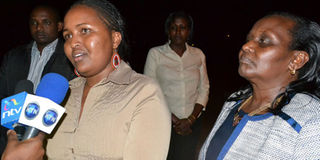Women politicians seek elective seats in August polls

Nominated Senator Naisula Lesuuda (left) and Samburu women representative Maison Leshoomo in the past. They wan a security operation in Laikipia stopped. FILE PHOTO | JEFF ANGOTE |
What you need to know:
- Nominated leaders Naisula Lesuuda and Sarah Korere will be following in the footsteps of those before them who used their nomination to Parliament as a stepping stone to election.
- Ms Lesuuda reckons that with the opportunity to fund the education of the youth through bursaries, she could give them the same chances that were given to her.
As the International Women’s Day is marked on Wednesday, for many women lawmakers in Kenya, it will be one more day in the countdown to the next big event in their political lives – the General Election on August 8.
Nominated leaders Naisula Lesuuda and Sarah Korere will be following in the footsteps of those before them who used their nomination to Parliament as a stepping stone to election.
Ms Lesuuda is among nominated senators who have decided to ditch the Senate and seek to be elected into the more crowded and often unruly House, the National Assembly.
Others who have made that decision include Beatrice Elachi, who is going for the Dagoretti North seat, Emma Mbura (Rabai) and Joy Gwendo (Kisumu East). Nominated senator Godliver Omondi has taken the unprecedented decision to go for the position of MCA.
Unlike their colleagues, Ms Lesuuda and nominated MP Korere will be pioneers of sorts as they will be seeking elective seats in communities that remain almost entirely patriarchal.
Both Ms Lesuuda and Ms Korere see the National Assembly as better placed to make an impact on the lives of their people. This is mainly because of the influence MPs have over the use of the Constituency Development Fund.
FUND EDUCATION
“You can directly impact on people’s lives with their resources, because these are their resources,” said Ms Lesuuda who said she felt the weight of responsibility was heavier when a person is elected rather than nominated.
She added: “There is a difference between when you are nominated and when you have the mandate of your people. You can stand up for their rights. You really speak on their behalf then,” she said.
Ms Lesuuda reckons that with the opportunity to fund the education of the youth through bursaries, she could give them the same chances that were given to her.
It is the same for Ms Korere, who credits education for what she has been able to achieve so far, both as an nominated MP and a leader in her community. “I think it will give me an opportunity to serve my people better,” she told the Nation.
But seeking an elective position is not easy, especially in a constituency where women have traditionally not asked for votes.
Ms Lesuuda listed among the challenges the fact that she is the first woman to go for the parliamentary seat in her community. Some people, she said, told her to go for the seat exclusively reserved for women, that is the Samburu woman representative position.
PERSONAL ATTACKS
When you seek a political seat in a conflict-prone area like Samburu or Laikipia, being a leader is also taken quite literally, and some people tell them that women don’t lead people to war.
Both have faced personal attacks from their opponents, especially men, and critics. This has become the trend whenever a woman runs for office.
For Ms Lesuuda, it was an attack at Serian FM offices where she had gone for an interview.
Ms Korere said while she initially used to get embarrassed when drunken youths insulted her at political meetings, she has now grown thick skin. “I’m now used to abusive language. It doesn’t deter me now,” she said.
Like Ms Lesuuda, she has also encountered physical threats. She said she had not taken it seriously when her vehicle was shot at last year but things became worse when she was sent emissaries with the message that she drops her bid.
With recent changes in the laws requiring political parties to have more balanced leadership, more women stand a chance to have their names on the ballot.
They can, as the theme for this year’s women’s day goes, Be Bold for Change.





